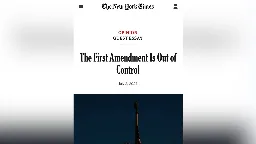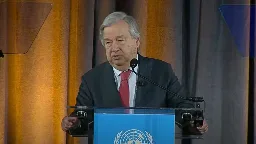
Tyranny
- Eric Schmidt's AI Think Tank Urges NATO to Monitor "Disinformation" in Real-Time, Coordinate Responsesreclaimthenet.org Eric Schmidt's AI Think Tank Urges NATO to Monitor "Disinformation" in Real-Time, Coordinate Responses
Eric Schmidt's think tank pushes for NATO-led real-time disinformation surveillance, edging toward the controversial realm of "prebunking" as a new strategy in information warfare.

You might still think about Eric Schmidt as a “(big) tech guy” and businessman, but his passion for (geo)politics was always evident, even while he served as Google’s CEO.
These days, Schmidt is the chair of the Special Competitive Studies Project (SCSP), a think tank that would like to position itself as a reference point to a military alliance, NATO, and get it to “monitor disinformation in real-time.”
SCSP’s ambition is no less than to help craft new national security strategies, always with an eye on the alleged attempts to increase disinformation (here AI is to blame) – but also ways to combat that, and here, SCSP says (the US) must strengthen its “AI competitiveness.”
The goal is to “win” what’s referred to as the techno-economic competition by 2030 – there’s that deadline, favored by many a controversial globalist initiative.
Here, the group would like NATO and its members to fight against what is described as AI disinformation, that new chapter in information warfare.
Schmidt’s think tank doesn’t like what’s seen as the current reactive approach and the tired old debunking. That means there must be an “active” one – and the replacement for debunking would logically be some form of the dystopian concept of “prebunking.”
(SCSP mentions both as desirable methods in a late 2022 report, but this time shies away from using the latter term.)
SCSP wants various actors to carry out real-time surveillance of “disinformation” by means of spending money on tools fed with publicly available online data (aka, the cynically named “open source” data).
In other words, real-time mass-scale internet data scraping. Such tools already exist and are used by law enforcement, causing various levels of controversy.
Next comes prebunking, even if the latest batch of SCSP recommendations stops short of calling it that.
But what would you call it?
“NATO should provide its own positive narrative to get out ahead of disinformation, and highlight failures of authoritarian regimes, especially on their own digital platforms.”
And to make this work, SCSP wants NATO to co-opt various governments and companies, as well as NGOs. Inside the alliance, a “disinformation unit” should be formed.
Last but not least, the think tank says – “Foster healthy skepticism.”
Perhaps starting with SCSP’s own roles, goals, and affiliations.
- New Documents Show the FBI Implemented Nationwide Social Media Monitoring Ahead of the 2022 Midtermsweb.archive.org New Documents Show the FBI Implemented Nationwide Social Media Monitoring Ahead of the 2022 Midterms
Lawsuit reveals FBI's extensive monitoring of domestic social media.
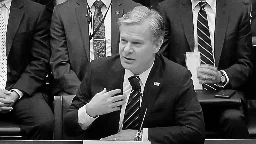
America First Legal (AFL) has disclosed documents obtained through a lawsuit against the FBI and the Department of Justice (DOJ), accusing them of concealing federal records that detail government-sponsored censorship by the Biden-Harris administration before the 2022 midterm elections.
The documents revealed that the FBI’s National Election Command Post (NECP) had compiled lists of social media accounts posting what they considered “misinformation,” extending from New York to San Francisco. This included the Right Side Broadcasting Network, cited by Matt Taibbi as targeted for “additional action” by the FBI.
These lists were so extensive that they were compiled into Word documents “due to the volume of posts.” NECP, operating from the FBI Headquarters and aided by DOJ attorneys and liaisons from five non-DOJ agencies, was responsible for vetting the information and directing actions across various field offices. They focused not only on foreign threats but also on cyber intrusions and potential criminal violations linked to election law.
Domestically, accounts like “@RSBNetwork” were flagged for issues related to election law violations, seemingly unconnected to foreign influence or cyber threats. NECP specifically instructed the San Francisco field office to send “preservation letters” to maintain relevant user information until legal actions could be formally initiated.
The Inspector General’s report outlines the legal procedures the FBI might use to compel evidence production from third parties. These range from grand jury subpoenas for current subscriber information, including personal details and payment methods, to district court orders for historical data under the Electronic Communications Privacy Act. In more severe cases, the FBI might request a search warrant for detailed content or ongoing investigation data.
This pattern of surveillance and legal pressure reflects a broader governmental approach that views alleged “misinformation” as a law enforcement issue. This stance has led to significant concerns about free speech, especially given recent cases where individuals faced prosecution for online activities deemed misleading by authorities.
- Elon Musk Exposes EU's Censorship Demandsweb.archive.org Elon Musk Exposes EU's Censorship Demands
X faces potential fines and structural changes as EU criticizes platform's lack of transparency and compliance with new regulations.

Elon Musk has suggested that the European Union attempted to coerce him with an underhanded deal to secretly implement censorship within his platform. Musk further added that EU-designed negotiations were accepted by other online platforms. However, he outrightly rejected the concealed deal.
On Friday, the EU made strides in evidencing the potency of its fresh Digital Services Act (DSA) by launching an attack on X, which is owned by Musk.
The group accused X of being in violation of specific EU regulations and threatened the platform with punitive fines. In response to this, Musk was quick to counter-attack by criticizing the DSA as a “canned misinformation” source. He further revealed that the EU had solicited a clandestine deal with him for entering into censorship pertaining to the EU’s directives.
In his revelation, Musk stated, “The European Commission offered [X] an illegal secret deal: if we quietly censored speech without telling anyone, they would not fine us.” He assured his stance by saying, “The other platforms accepted that deal,” however, he did not agree to participate. He also expressed his anticipations for the future, saying, “We look forward to a very public battle in court, so that the people of Europe can know the truth.”
The European Union criticized X for its lack of transparency and pointed out that social media platforms are obligated to counteract “illegal content” as well as “risks to public security” as per its regulations. Furthermore, the EU claimed that it was discontent with the X’s blue check system, deeming it incompatible with the “industry practice.”
In case of non-compliance with EU’s stipulations, X could face repercussions, including a potential fine equivalent to six percent of its total global turnover.
- Think Tank Pushes International Alliance To Censor "Fake News"web.archive.org Think Tank Pushes International Alliance To Censor "Fake News"
Preemptively labeling narratives as "misinformation" stifles free speech and public trust.

The Japanese chair of the Center for Strategic and International Studies (CSIS) has come out with a report calling for the US and Japan to team up on “combating disinformation.”
Christopher B. Johnstone also wants the two countries to engage in several censorship techniques, such as removing content (“false narratives” – regular censorship) but also a considerably more dystopian one known as “prebunking.”
That would be, suppressing narratives by revealing them as “misinformation” before they become public, thus eroding the very perception of their trustworthiness, while equating this as introducing “mental antibodies” into a population, and other outlandish language has been used in the past to justify the tactic.
CSIS mentions in a press release announcing the report that Johnstone had a meeting with Japanese Ministry of Foreign Affairs Director of Public Diplomacy Strategy Division Hideaki Ishii, “to discuss how the United States and Japan can cooperate to address this critical challenge” (namely, combating “disinformation”).
Not for nothing – CSIS is not your run-of-the-mill nonprofit, and access to government structures in other countries is not surprising, given its origins and image as one of those think tanks that have an oversized influence on US foreign policy.
Now, CSIS wants Japan and the US to tackle “information operations” such as (real or labeled as such) disinformation threats. The report seeks to establish an agenda to increase this collaboration and mentions that the paper includes “the results of a closed-door conference held at CSIS in February” – attended by “experts” from both countries.
The part of the report that addresses strategies to counter the threat, defined by CSIS, includes public education and media literacy, AI (as a tool of censorship – but without failing to mention the same tech as supposedly a grave threat to democracies when it’s used to create deepfakes).
Another thing CSIS likes is “fact-checking” (while critical of Japan as being “somewhat late” to this particular game), as well as debunking.
And then, there’s “prebunking” which CSIS chooses to describe as a method that proactively issues “forewarnings” and also “preemptively refutes false narratives.”
Coming back to Earth a little bit, so to speak – in terms of championing more conventional information control tools, the CSIS strategy lastly mentions “labeling, transparency, and risk monitoring.”
- Canada Allocates $146.6M for New Censorship Commission to Enforce Online Harms Actweb.archive.org Canada Allocates $146.6M for New Censorship Commission to Enforce Online Harms Act
Massive funding aims to enforce controversial online censorship and regulate free speech.

Canada’s government has decided to spend some $146.6 million (CAD 200 million) and employ, full-time, 330 more people to be able to implement the Online Harms Act (Bill C-63).
That is the monetary cost of bureaucratic red tape necessary to make this bill, which has moved for a second reading in Canada’s House of Commons, eventually happen.
At the same time, the cost to the country’s democracy could be immeasurable – given some of this sweeping censorship legislation’s more draconian provisions, primarily focused on what the authorities choose to consider to be “hate speech.”
Some of those provisions could land people under house arrest, and have their internet access cut simply for “fear” they could, going forward, commit “hate crime” or “hate propaganda.”
If these are found to be committed in conjunction with other crimes, the envisaged punishment could be life in prison. Meanwhile, money fines go up to $51,080. And, to make matters even more controversial, the proposed law appears to apply to statements retroactively, namely, those made before Bill C-63’s possible passage and enactment as law.
The new body, the Digital Safety Commission, Ombudsperson, and Office will be in charge, and this is where the money will go and where the staff amount to 330 people. The spending estimate that has recently come to light covers the five years until 2029.
The office’s task – if the bill passes – will be to monitor, regulate, and censor online platforms, as per the Online Harms Act. Critics of the law are making a point of the distorted sense of priorities among Canada’s currently ruling regime, where a large amount of money is to be spent here, while vital sectors – such as combating actual, real-life serious crimes face funding restrictions.
Some of the purely pragmatic opposition to the bill has to do with the belief that it will – while violating citizens’ freedoms and rights – actually, prove to be unable to tackle what it is supposedly designed to do – various forms of online harassment.
And that’s not all. “Canadian taxpayers will likely be stuck footing the bill for a massive bureaucracy that will allow Big Tech companies to negotiate favorable terms with non-elected regulators behind closed doors,” is how MP Michelle Rempel Garner articulated it.
- House Report Reveals the Global Alliance for Responsible Media (GARM) Role in Stifling Online Discourseweb.archive.org House Report Reveals GARM’s Role in Stifling Online Discourse
Potential violations of federal antitrust laws highlight GARM's significant influence and its role in shaping online discourse.

A new report from the House Judiciary Committee released on Wednesday, and confirming our previous reporting, casts the Global Alliance for Responsible Media (GARM) under scrutiny, suggesting potential violations of federal antitrust laws due to its outsized influence in the advertising sector.
We obtained a copy of the report for you here.
Established in 2019 by Rob Rakowitz and the World Federation of Advertisers, GARM has been accused of leveraging this influence to systematically restrict certain viewpoints online and sideline platforms advocating divergent views.
The organization, initially conceived to manage the surge of free speech online, is reported to coordinate with major industry players including Proctor & Gamble, Mars, Unilever, Diageo, GroupM, and others. The collaboration appears to stretch across the largest ad agency holding companies worldwide, known collectively as the Big Six. Such collaboration raises concerns about a concerted effort to police content, especially content that challenges mainstream narratives.
Specifically, the report highlights GARM’s actions following the rebranding of Twitter by Elon Musk and its attempts to silence discussions on controversial topics like COVID-19 vaccines on Spotify’s “The Joe Rogan Experience.” Despite no “brand safety” risks acknowledged by GroupM, GARM still pressed for advertising restrictions on Rogan’s podcast.
Moreover, internal communications within GARM reveal selective targeting against platforms like The Daily Wire, categorized under the “Global High Risk exclusion list” for purportedly promoting “Conspiracy Theories.” The report also includes examples where GARM leaders expressed disdain towards conservative outlets such as Fox News, The Daily Wire, and Breitbart News, aiming to curtail their advertising revenue by labeling their content as objectionable.
The committee’s findings suggest that GARM’s methods not only potentially contravene Section 1 of the Sherman Act, which prohibits conspiracies that restrain commerce but also infringe upon fundamental American freedoms by censoring protected speech. This has raised significant concerns about the implications for democratic values and the diversity of voices in the American public sphere.
In response to these allegations, the House Judiciary Committee has called for a hearing, which was held today, to examine whether the current antitrust law enforcement and penalties are sufficient to address such collusive behaviors within online advertising, signaling a critical review of how advertising power is wielded in the digital age.
- Australia’s Chief Censor Accused of Exaggerating the Rise in Online Abuse and Engaging in “Politically Charged Censorship"web.archive.org Australia’s Chief Censor Accused of Exaggerating the Rise in Online Abuse and Engaging in “Politically Charged Censorship"
Newly released documents reveal inconsistencies between Grant's public warnings and actual complaints data, sparking debate over political motives and censorship.

Another week, another controversy involving the conduct of Australia’s eSafety Commissioner Julie Inman Grant.
Grant’s job officially is to direct efforts against misinformation and other online harms – but her actions have earned her the pejorative “titles” of the country’s “chief censor” and “censorship czar.”
The latest round of criticism aimed Grant’s way has to do with her role around last year’s failed Indigenous Voice referendum, when, according to newly unearthed documents (the result of the Institute of Public Affairs, IPA, FOIA requests) this official in fact contributed to spreading misinformation, rather than combating it – and making the dreaded “divisive debates” even worse.
It appears Grant’s tactic to shore up the policy pushed by the “yes” camp ahead of the referendum was to make unfounded claims about the number of race-related complaints her office was likely to receive from Indigenous Australians, as well as the number of racially motivated online incidents.
As the referendum, held in mid-October 2023, was approaching, Grant spoke for the Australian to, effectively, engage in fearmongering around the issue, when she said she expected this type of attack to rise ahead of the vote.
Grant also claimed at the time that levels of online abuse targeting this part of the population were already “high.”
However, the FOIA documents suggest that she was exaggerating the threat for political (and possibly funding) reasons. It has now been revealed that from January 2022 until October 2023, Grant’s office received a total of two complaints from Indigenous Australians that specifically had to do with the upcoming referendum.
As it was approaching – from July to September last year – this number was 30 – or 0.4% percent of all complaints eSafety had received. And not in a single case related to the referendum did this content eventually warrant removal.
All this begs the question of Grant’s intent while coming up with “dire warnings” apparently unsupported by any facts available to her.
One result was that the government increased her agency’s budget to $42.5 million per year (from $10.3). And then there was simply “politically charged censorship,” as IPA Director of Law and Policy John Storey described it.
Storey added: “The narrative Julie Inman Grant has sought to establish, that there was a wave of racist cyber abuse during the referendum, is not supported by her own office’s data.”
- From Prosecutor to Censor: Barbara McQuade’s Call to Erode Free Speechweb.archive.org From Prosecutor to Censor: Barbara McQuade’s Call to Erode Free Speech
Turning her focus from judicial duties to battling disinformation, McQuade suggests regulating algorithms as a means to bypass First Amendment challenges.

Barbara McQuade, who was in 2017 dismissed from her job as US Attorney for the Eastern District of Michigan, has in the meantime turned into quite something of a “misinformation warrior.”
Earlier this year McQuade – who in the past also worked as co-chair of the Terrorism and National Security Subcommittee of the Attorney General’s Advisory Committee in the Obama Administration – published a book, “Attack from Within: How Disinformation is Sabotaging America.”
Now, she herself is attacking the First Amendment as standing in the way of censorship (“content moderation”) and advocating in favor of essentially finding ways to bypass it. Opponents might see this as particularly disheartening, coming from somebody who used to hold such a high judicial office.
“The better course for regulating social media and online content might be to look at processes versus content because content is so tricky in terms of First Amendment protections. Regulating some of the processes could include things like the algorithms,” McQuade said.
This point – that the First Amendment serves precisely the purpose it was designed for – has lately been cropping up more and more frequently in the liberal spectrum of US politics, with the situation resembling a coordinated “narrative building.”
McQuade also sticks to the script, as it were, on other common talking points this campaign season: the dangers of AI (as a tool of “misinformation” – but the same camp loves AI as a tool of censorship). In the scenario where AI is perceived as a threat, McQuade wants new laws to regulate the field.
And she repeats the suddenly renewed calls to change CDA’s Section 230 in a particular way – namely, a way that pressures social platforms to toe the line, or else see legal protections afforded to them eroded.
This is phrased as amending the legislation to provide for civil liability, i.e., “money damages” if companies behind these platforms are found to not force users to label AI-generated content or delete bot accounts diligently enough.
McQuade’s comments regarding Section 230 are made in the context of her ideas on “regulating processes rather than content” (as a way to circumvent the First Amendment).
While on the face of it, stepping up bot removal sounds reasonable, there are reasons to fear this could be yet another false narrative whose actual goal is punishing platforms for not deleting real accounts falsely accused of being “bots” by certain media and politicians.
The Hamilton 68 case, exposed in the Twitter Files, is an example of this.
- Former Biden Advisor Claims "The First Amendment Is Out of Control," Hinders Government Action
Even the New York Times looks like it’s treading somewhat lightly while publishing articles aimed at dismantling the very concept of the First Amendment.
An opinion piece penned by an Obama and Biden administration adviser, Tim Wu, is therefore labeled as a “guest essay.” But was it the author, or the newspaper, who decided on the title? Because it is quite scandalous.
“The First Amendment is Out of Control” – that’s the title.
Meanwhile, many believe that attacks on this speech-protecting constitutional amendment are what’s actually out of control these days.
Wu takes a somewhat innovative route to argue against free speech: he painstakingly frames it as concern that the universally mistrusted Big Tech might be abusing it, with the latest Supreme Court ruling regarding Texas and Florida laws, (ab)used as an example.
When the government colludes with mighty entities like major social platforms – the First Amendment becomes the primary recourse to defend speech now expressed in public square forums forged through the pervasiveness of the internet.
So despite Wu’s effort to make his message seem unbiased, the actual takeaways are astonishing: one is that the First Amendment is an obstacle for the government to protect citizens (for being invoked as a tool restraining censorship?)
But this means that the First Amendment, designed to protect citizens from government censorship, is doing its job.
In the same vein, contrary to the sentiment of this “essay,” the amendment is there not to protect “national security” – nor does free speech undermine that, in a democracy.
You don’t like TikTok? Let’s just ban it…but the pesky First Amendment stands in the way of that? What Wu ignores here is that the bill that allows banning TikTok is so ambiguous it can be used to get rid of other, for whatever reason, “disliked” apps.
Wu also doesn’t like that the amendment is used to counter privacy and security-undermining age verification laws, like California’s Age-Appropriate Design Code.
“Suicide pact” is how Wu referred to the impact of the First Amendment in the 1949 dissenting opinion in the Terminiello v. City of Chicago “riot incitement” case.
As has lately become the norm with the First Amendment detractors: this is lots of words, most of them empty, some dramatic, but overall, free speech-unfriendly.
- European Council Makes Countering “Disinformation and Hate Speech” Part of Its Strategic Agendaweb.archive.org European Council Makes Countering “Disinformation and Hate Speech” Part of Its Strategic Agenda
New agenda. New censorship concerns.

The EU Council has managed to nestle fighting “disinformation and hate speech” between such issues as the Middle East, Ukraine, and migration – not to mention while at the same time appointing a new set of “apparatchiks,” in the wake of the European Parliament elections.
This proceeds from the Council’s 2024-2029 strategic agenda, adopted on June 27. This document represents a “five-year plan” to guide the bloc’s policy and goals.
Under the heading, “A free and democratic Europe,” the document addresses different ways in which “European values” will be upheld going forward. The Council’s conclusions state that in order to strengthen the EU’s “democratic resilience,” what it decides is disinformation and hate speech will have to be countered.
These categories of speech are infamously arbitrarily defined, even in legislation, and habitually used as a tool of censorship – but the conclusions count combating them among the strategic goal of fending off foreign interference and destabilization.
In other words, those individuals or organizations that are found to be “guilty” of hate speech or disinformation might face the grim possibility of being treated as, essentially, a threat to the EU’s security.
Another promise the document makes in the same breath is that tech giants will be made to “take their responsibility for safeguarding democratic dialogue online.”
Does this mean there will be more or less censorship in the EU over the next five years? The Brussels bureaucrats are at this point so practiced at churning out platitudes that, theoretically, this statement could be interpreted either way.
However, in conjunction with the “misinformation” etc., talk, it is fairly clear which course the EU intends to keep when it comes to online freedom of expression.
AI is not explicitly mentioned as a threat (either to the EU or by the EU, as the technology that can be used to ramp up censorship, aka, “combat misinformation”).
However, you name it, the EU supposedly has it: under the part of the conclusions addressing competitiveness, increasing capacities related to AI sits right there with growing defense, space, quantum technologies, semiconductors, health, biotechnologies capabilities – not to mention “net-zero technologies, mobility, pharmaceuticals, chemicals, and advanced materials.”
It’s a pretty comprehensive bridge the EU appears to be trying to sell to its member-states and their citizens.
- X Re-Joins Pro-Censorship Advertisers' Allianceweb.archive.org X Re-Joins Pro-Censorship Advertisers' Alliance
Despite Twitter Files' revelations on censorship, X rejoins the pro-censorship GARM.

Given how X has gone out of its way to reveal the depth and breadth of online censorship via the Twitter Files, this makes for an awkward reunion: the company has decided to rejoin the Global Alliance for Responsible Media (GARM).
It’s a pro-censorship, World Economic Forum-affiliated advertisers’ group, that achieves its objectives through the “brand safety” route (i.e., the censorship “brand” here would be demonetization). And last summer, it was scrutinized by the US Congress.
GARM is one of those outfits whose roots are very entangled (comes in handy when somebody tries to probe your activities, though) – and the chronology is not insignificant either: formed in 2019 as a World Federation of Advertisers (WFA) initiative, partnered with the Association of National Advertisers (ANA).
Then came another “partnership” – that with WEF (World Economic Forum), specifically, its Shaping the Future of Media, Entertainment, and Sport project – a “flagship” one.
In May 2023, the US House Judiciary Committee wanted to know what exactly was happening here, and whether “brand safety” as a concept, as exercised by these entities, could be linked to censorship of online speech.
So the Committee subpoenaed the World Federation of Advertisers (and GARM), asking for records that might show whether these groups “coordinated efforts to demonetize and censor disfavored speech online.”
Committee Chairman Jim Jordan was at the time concerned that this conduct might have run afoul of US antitrust laws.
For X, despite the strides the platform has made toward protecting users’ speech since the Twitter takeover, the GARM relationship is most likely simply about (ad) money – and one of the several efforts to make the platform profitable at last.
Those who were hoping for a “free speech absolutism” on a platform like this might be disappointed, the Congress might investigate some more; but ultimately, the move represents a “realpolitik-style” compromise.
And so X is “excited” and “proud” to be back as a GARM member. The company’s “Safety” account posted something about “the safety of our global town square” apparently being relevant to this decision, but did not elaborate.
Now listed by GARM along with X are YouTube and Chanel – and, in between, some of the biggest pharma and telecoms out there.
Big Money, one might say.
- Meta’s Oversight Board Is Helping Big Tech Companies Comply With the EU’s Censorship Lawweb.archive.org Meta’s Oversight Board Is Helping Big Tech Companies Comply With the EU’s Censorship Law
Meta's Oversight Board eyes the EU's Digital Services Act as a potential funding source to continue its contentious content moderation efforts.

Corporate legacy media are trying to keep key social platforms “in check” by running stories about them complying – or being complicit, or compatible with – some of the currently most notorious anti-free speech legislation.
Meta’s Oversight Board is thus said to be working to adhere to the EU’s Digital Services Act (DSA) – but perhaps not as efficiently as it should.
Yet before any entity can execute censorship, it must be funded, since it all eventually, one way or another, comes down to money. In this case, Meta has apparently been increasingly less enthusiastic about providing that money.
But now, the Board appears to be looking at the DSA as an avenue to get the money, so that “the mission” may continue.
This sum-up of the seemingly muddled train-of-thought reporting comes from the Washington Post – but the key point behind it seems to be closer to home in the US, than anything that may or may not be happening in Europe.
Meta’s Board was first conceived in 2018 – as the corporation was still trying to fight off (what turned out to be debunked) accusations that it allowed foreign propaganda to fully steer US elections, two years prior.
Facebook (Meta) was happy to establish the Board – and in the process essentially agreed with the 2016 election integrity deniers who claimed it was something other than the majority vote cast by US citizens who decided the outcome.
Meta may have done it just to get rabid politicians and media off their back – but in the meantime, it looks like the company lost the will to keep spending money on the Board.
Now, with another election coming up, the same media are criticizing the Board as having failed their expectations in the US – but they still want it there, and the EU might provide the financial lifeline.
The Washington Post calls it nothing short of the Oversight Board possibly getting “a second chance.” To do what?
Apparently, let a “court of journalists, analysts and experts (…) investigate Meta’s handling of controversial posts” – and reinstate Facebook to its supposedly existing pre-2016 glory (restore “Meta’s blemished reputation,” as WaPo puts it).
Now, the EU comes into the picture, and the DSA is a possible new “funding factor.”
“The Oversight Board administrators touted (to the EU) the group’s experience in making impartial decisions about contentious content moderation challenges facing Meta, according to a slide-deck pitch, which was viewed by the Washington Post,” said the report.
- Autocrats Simulate War With Each Othercryptome.substack.com Autocrats Simulate War With Each Other
Thank you for sharing your thoughts with The New York Times community. Cryptome | NY Correct, in spades. Believers in democracy have always faced those who favor the benefits of autocracy, with the support of autocractic military and police, and, not least legislators and lawyers and other professio...

Correct, in spades. Believers in democracy have always faced those who favor the benefits of autocracy, with the support of autocractic military and police, and, not least legislators and lawyers and other professions regulated by themselves (lawyers and judges) or by the state. Voting by the populace was intended to give final say to to the citizenry but that openness was gradually supplanted by political parties themselves autocractic modeled after the legacy of top down rulers ostensibly blessed by deity or deities with aboriginal autocracy headed by the Top Dog with absolute power. This struggle between the populace and centralized power periodically erupts into revolution but not often, instead coups prevail as autocrats wage internecine combat with one another. The US may be seen as one revolution that succeeded where so many others failed, but then set up an authoritarian government modeled on predecessors, the makers seemingly unable to originate a wholly democratic governance due to fear of rabble-rousers who have toppled the leaders and their minions. So at this time the topmost offices, POTUS and SCOTUS and Congress are waging political war with demands that law follow their own interests at the expense of the citizenry. Could this portend a new American Revolution, daresay that's a long shot so long as the top officeholders are backed by the military and police, and, yep, the lawyers, especially those who have violated their oaths of service, and journalists.
- Fact-Checking Network Says Online Fact Checks Aren't Censorshipweb.archive.org Fact-Checking Network Says Online Fact Checks Aren't Censorship
But labeled posts have lower algorithmic reach.

We now live in a world where “fact-checkers” organize “annual meetings” – one is happening just this week in Bosnia and Herzegovina.
These censorship-overseers for other companies (most notably massive social platforms like Facebook, etc.) have not only converged onto Sarajevo but have issued a “statement” that includes the town’s name.
The Poynter Institute is a major player in this space, and its International Fact-Checking Network (IFCN) serves to coordinate censorship for Meta, among others.
It was up to IFCN now to issue the “Sarajevo statement” on behalf of 130 groups in the “fact-checking” business, a burgeoning industry at this point spreading its tentacles to at least 80 countries – that is how many are behind the said statement.
No surprise, these “fact-checkers” like themselves, and see nothing wrong with what they do; the self-affirming statement refers to the (Poynter-led) brand of “fact-checking” as essential to free speech (will someone fact-check that statement, though?)
The reason the focus is on free speech is clear – “fact-checkers” have over and over again proven themselves to be either inept, biased, serving as tools of censorship, all three, or some combination of those.
That is why their “annual meeting” now declares, with a seemingly straight face, that “fact-checking” is not only a free-speech advocate but “should never be considered a form of censorship.”
But who’s going to tell Meta? In the wake of the 2016 US presidential elections, Facebook basically became the fall guy picked by those who didn’t like the outcome of the vote, accusing the platform of being the place where a (since debunked) massive “misinformation meddling campaign” happened.
Aware of the consequences its business might suffer if such a perceived image continued, Facebook by 2019, just ahead of another election, had as many as 50 “fact-checking” partners, “reviewing and rating” content.
In 2019, reports were clearly spelling out how the thing works – it’s in stark contrast with the “Sarajevo statement” and the “… never censorship…” claim.
And this is how it worked: “Fact-checked” posts are automatically marked on Facebook, and videos that have been rated as “false” are still shareable but are shown lower in news feeds by Facebook’s algorithm.
Meta CEO Mark Zuckerberg has also said that warning labels on posts curb the number of shares by 95%.
“We work with independent fact-checkers. Since the COVID outbreak, they have issued 7,500 notices of misinformation which has led to us issuing 50 million warning labels on posts. We know these are effective because 95% of the time, users don’t click through to the content with a warning label,” Zuckerberg revealed.
That was before the 2020 vote. There is not one reason to believe that, if things have in the meanwhile changed, they have changed for the better – at least where free speech is concerned.
- UN Project Aims To Combat "Misinformation," "Hate Speech," Recommends Algorithmic Censorship and Demonetization
The United Nations has unveiled the latest in a series of censorship initiatives, this one dubbed, the Global Principles for Information Integrity.
Neither the problems nor the solutions, as identified by the principles, are anything new; rather, they sound like regurgitated narratives heard from various nation-states, only this time lent the supposed clout of the UN and its chief, Antonio Guterres.
The topic is, “harm from misinformation and disinformation, and hate speech” – and this is presented with a sense of urgency, calling for immediate action from, once again, the usual group of entities that are supposed to execute censorship: governments, tech companies, media, advertisers, PR firms.
They are at once asked not to use or amplify “disinformation and hate speech” and then also combat it with some tried-and-tested tools: essentially algorithm manipulation (by “limiting algorithmic amplification”), labeling content, and the UN did not stop short of recommending demonetizing the “offenders.”
Presenting the plan on Monday, Guterres made the obligatory mention of doing all that while “at the same time upholding human rights such as freedom of speech.”
According to the UN secretary-general, billions of people are currently in grave danger due to exposure to lies and false narratives (but he doesn’t specify what kind). However, that becomes fairly clear as he goes on to mention that action is needed to “safeguard democracy, human rights, public health, and climate action.”
Guterres also spoke about alleged conspiracy theories and a “tsunami of falsehoods” that he asserts are putting UN peacekeepers at risk.
This is interesting not only because of the tone and narrative the UN chief chose to go with but also as a reminder that peacekeeping, rather than policing social platforms and online speech, used to be one of the UN’s primary reasons for existing and spending money member-countries taxpayer money.
Guterres revealed that the principles stand against algorithms deciding what people see online (another attack on YouTube, etc., recommendations system, for all the wrong reasons?). But he reassures his audience the idea is to “prioritize safety and privacy over advertising,” i.e., profit.
The next thing Guterres wants these decidedly for-profit behemoths, including advertisers, to do is make sure tech companies keep them abreast so as not to “end up inadvertently funding disinformation or hateful messaging.”
According to him, the principles are there to “empower people to demand their rights, help protect children, ensure honest and trustworthy information for young people, and enable public interest-based media to convey reliable and accurate information.”
- Supreme Court Sides With Biden Administration Over Accusations of Social Media Censorship Pressureweb.archive.org Supreme Court Sides With Biden Administration Over Accusations of Social Media Censorship Pressure
Major implications for free speech.
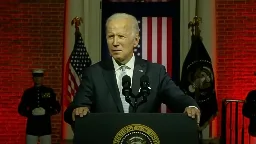
The US Supreme Court has ruled in the hotly-awaited decision for the Murthy v. Missouri case, reinforcing the government's ability to engage with social media companies concerning the removal of speech about COVID-19 and more. This decision reverses the findings of two lower courts that these actions infringe upon First Amendment rights.
The opinion, decided by a 6-3 vote, found that the plaintiffs, lacked the standing to sue the Biden administration. The dissenting opinions came from conservative justices Samuel Alito, Clarence Thomas, and Neil Gorsuch.
We obtained a copy of the ruling for you here.
John Vecchione, Senior Litigation Counsel at NCLA, responded to the ruling, telling Reclaim The Net, "The majority of the Supreme Court has declared open season on Americans' free speech rights on the internet," referring to the decision as an "ukase" that permits the federal government to influence third-party platforms to silence dissenting voices. Vecchione accused the Court of ignoring evidence and abdicating its responsibility to hold the government accountable for its actions that crush free speech. "The Government can press third parties to silence you, but the Supreme Court will not find you have standing to complain about it absent them referring to you by name apparently. This is a bad day for the First Amendment," he added.
Jenin Younes, another Litigation Counsel at NCLA, echoed Vecchione's sentiments, labeling the decision a "travesty for the First Amendment" and a setback for the pursuit of scientific knowledge. "The Court has green-lighted the government's unprecedented censorship regime," Younes commented, reflecting concerns that the ruling might stifle expert voices on crucial public health and policy issues.
Here is the content converted to Markdown:
Further expressing the gravity of the situation, Dr. Jayanta Bhattacharya, a client of NCLA and a professor at Stanford University, criticized the Biden Administration's regulatory actions during the COVID-19 pandemic. Dr. Bhattacharya argued that these actions led to "irrational policies" and noted, "Free speech is essential to science, to public health, and to good health." He called for congressional action and a public movement to restore and protect free speech rights in America.
This ruling comes as a setback to efforts supported by many who argue that the administration, together with federal agencies, is pushing social media platforms to suppress voices by labeling their content as misinformation.
Previously, a judge in Louisiana had criticized the federal agencies for acting like an Orwellian "Ministry of Truth." However, during the Supreme Court's oral arguments, it was argued by the government that their requests for social media platforms to address "misinformation" more rigorously did not constitute threats or imply any legal repercussions – despite the looming threat of antitrust action against Big Tech.
Here are the key points and specific quotes from the decision:
Lack of Article III Standing: The Supreme Court held that neither the individual nor the state plaintiffs established the necessary standing to seek an injunction against government defendants. The decision emphasizes the fundamental requirement of a "case or controversy" under Article III, which necessitates that plaintiffs demonstrate an injury that is "concrete, particularized, and actual or imminent; fairly traceable to the challenged action; and redressable by a favorable ruling" (Clapper v. Amnesty Int'l USA, 568 U. S. 398, 409).
Inadequate Traceability and Future Harm: The plaintiffs failed to convincingly link past social media restrictions and government communications with the platforms. The decision critiques the Fifth Circuit's approach, noting that the evidence did not conclusively show that government actions directly caused the platforms' moderation decisions. The Court pointed out: "Because standing is not dispensed in gross, plaintiffs must demonstrate standing for each claim they press" against each defendant, "and for each form of relief they seek" (TransUnion LLC v. Ramirez, 594 U. S. 413, 431). The complexity arises because the platforms had "independent incentives to moderate content and often exercised their own judgment."
Absence of Direct Causation: The Court noted that the platforms began suppressing COVID-19 content before the defendants' challenged communications began, indicating a lack of direct government coercion: "Complicating the plaintiffs' effort to demonstrate that each platform acted due to Government coercion, rather than its own judgment, is the fact that the platforms began to suppress the plaintiffs' COVID–19 content before the defendants' challenged communications started."
Redressability and Ongoing Harm: The plaintiffs argued they suffered from ongoing censorship, but the Court found this unpersuasive. The platforms continued their moderation practices even as government communication subsided, suggesting that future government actions were unlikely to alter these practices: "Without evidence of continued pressure from the defendants, the platforms remain free to enforce, or not to enforce, their policies—even those tainted by initial governmental coercion."
"Right to Listen" Theory Rejected: The Court rejected the plaintiffs' "right to listen" argument, stating that the First Amendment interest in receiving information does not automatically confer standing to challenge someone else's censorship: "While the Court has recognized a 'First Amendment right to receive information and ideas,' the Court has identified a cognizable injury only where the listener has a concrete, specific connection to the speaker."
Justice Alito's dissent argues that the First Amendment was violated by the actions of federal officials. He contends that these officials coerced social media platforms, like Facebook, to suppress certain viewpoints about COVID-19, which constituted unconstitutional censorship. Alito emphasizes that the government cannot use coercion to suppress speech and points out that this violates the core principles of the First Amendment, which is meant to protect free speech, especially speech that is essential to democratic self-government and public discourse on significant issues like public health.
Here are the key points of Justice Alito's stance:
Extensive Government Coercion: Alito describes a "far-reaching and widespread censorship campaign" by high-ranking officials, which he sees as a serious threat to free speech, asserting that these actions went beyond mere suggestion or influence into the realm of coercion. He states, "This is one of the most important free speech cases to reach this Court in years."
Impact on Plaintiffs: The dissent underscores that this government coercion affected various plaintiffs, including public health officials from states, medical professors, and others who wished to share views divergent from mainstream COVID-19 narratives. Alito notes, "Victims of the campaign perceived by the lower courts brought this action to ensure that the Government did not continue to coerce social media platforms to suppress speech."
Legal Analysis: Alito criticizes the majority's dismissal based on standing, arguing that the plaintiffs demonstrated both past and ongoing injuries caused by the government's actions, which were likely to continue without court intervention. He argues, "These past and threatened future injuries were caused by and traceable to censorship that the officials coerced."
Evidence of Coercion: The dissent points out specific instances where government officials pressured Facebook, suggesting significant consequences if the platform failed to comply with their demands to control misinformation. This included threats related to antitrust actions and other regulatory measures. Alito highlights, "Not surprisingly, these efforts bore fruit. Facebook adopted new rules that better conformed to the officials' wishes."
Potential for Future Abuse: Alito warns of the dangerous precedent set by the Court's refusal to address these issues, suggesting that it could empower future government officials to manipulate public discourse covertly. He cautions, "The Court, however, shirks that duty and thus permits the successful campaign of coercion in this case to stand as an attractive model for future officials who want to control what the people say, hear, and think."
Importance of Free Speech: He emphasizes the critical role of free speech in a democratic society, particularly for speech about public health and safety during the pandemic, and criticizes the government's efforts to suppress such speech through third parties like social media platforms. Alito asserts, "Freedom of speech serves many valuable purposes, but its most important role is protection of speech that is essential to democratic self-government."
The case revolved around allegations that the federal government, led by figures such as Dr. Vivek Murthy, the US Surgeon General, (though also lots more Biden administration officials) colluded with major technology companies to suppress speech on social media platforms. The plaintiffs argue that this collaboration targeted content labeled as "misinformation," particularly concerning COVID-19 and political matters, effectively silencing dissenting voices.
The plaintiffs claim that this coordination represents a direct violation of their First Amendment rights. They argue that while private companies can set their own content policies, government pressure that leads to the suppression of lawful speech constitutes unconstitutional censorship by proxy.
The government's campaign against what it called "misinformation," particularly during the COVID-19 pandemic – regardless of whether online statements turned out to be true or not – has been extensive.
However, Murthy v. Missouri exposed a darker side to these initiatives—where government officials allegedly overstepped their bounds by coercing tech companies to silence specific narratives.
Communications presented in court, including emails and meeting records, suggest a troubling pattern: government officials not only requested but demanded that tech companies remove or restrict certain content. The tone and content of these communications often implied serious consequences for non-compliance, raising questions about the extent to which these actions were voluntary versus compelled.
Tech companies like Facebook, Twitter, and Google have become the de facto public squares of the modern era, wielding immense power over what information is accessible to the public. Their content moderation policies, while designed to combat harmful content, have also been criticized for their lack of transparency and potential biases.
In this case, plaintiffs argued that these companies, under significant government pressure, went beyond their standard moderation practices. They allegedly engaged in the removal, suppression, and demotion of content that, although controversial, was not illegal. This raises a critical issue: the thin line between moderation and censorship, especially when influenced by government directives.
The Supreme Court ruling holds significant implications for the relationship between government actions and private social media platforms, as well as for the legal frameworks that govern free speech and content moderation.
Here are some of the broader impacts this ruling may have:
Clarification on Government Influence and Private Action: This decision clearly delineates the limits of government involvement in the content moderation practices of private social media platforms. It underscores that mere governmental encouragement or indirect pressure does not transform private content moderation into state action. This ruling could make it more challenging for future plaintiffs to claim that content moderation decisions, influenced indirectly by government suggestions or pressures, are tantamount to governmental censorship.
Stricter Standards for Proving Standing: The Supreme Court's emphasis on the necessity of concrete and particularized injuries directly traceable to the challenged government action sets a high bar for future litigants. Plaintiffs must now provide clear evidence that directly links government actions to the moderation practices that allegedly infringe on their speech rights. This could lead to fewer successful challenges against perceived government-induced censorship on digital platforms.
Impact on Content Moderation Policies: Social media platforms may feel more secure in enforcing their content moderation policies without fear of being seen as conduits for state action, as long as their decisions can be justified as independent from direct government coercion. This could lead to more assertive actions by platforms in moderating content deemed harmful or misleading, especially in critical areas like public health and election integrity.
Influence on Public Discourse: By affirming the autonomy of social media platforms in content moderation, the ruling potentially influences the nature of public discourse on these platforms. While platforms may continue to engage with government entities on issues like misinformation, they might do so with greater caution and transparency to avoid allegations of government coercion.
Future Legal Challenges and Policy Discussions: The ruling could prompt legislative responses, as policymakers may seek to address perceived gaps between government interests in combating misinformation and the protection of free speech on digital platforms. This may lead to new laws or regulations that more explicitly define the boundaries of acceptable government interaction with private companies in managing online content.
Broader Implications for Digital Rights and Privacy: The decision might also influence how digital rights and privacy are perceived and protected, particularly regarding how data from social media platforms is used or shared with government entities. This could lead to heightened scrutiny and potentially stricter guidelines to protect user data from being used in ways that could impinge on personal freedoms.
Overall, the Murthy v. Missouri ruling will likely serve as a critical reference point in ongoing debates about the government's ability to influence and shut down speech.
- UK Think Tank, Once Funded by US State Department, Calls for Stricter YouTube Censorshipweb.archive.org UK Think Tank, Once Funded by US State Department, Calls for Stricter YouTube Censorship
The Institute for Strategic Dialogue (ISD), a UK think tank that was in 2021 awarded a grant by the US State Department and got involved in censoring Americans, has come up with a “research project” that criticizes YouTube. The target is the platform’s recommendation algorithms, and, according to IS...

The Institute for Strategic Dialogue (ISD), a UK think tank that was in 2021 awarded a grant by the US State Department and got involved in censoring Americans, has come up with a “research project” that criticizes YouTube.
The target is the platform’s recommendation algorithms, and, according to ISD – which calls itself an extremism researching non-profit – there is a “pattern of recommending right-leaning and Christian videos.”
According to ISD, this is true even if users had not previously watched this type of content.
YouTube’s recommendation system has long been a thorn in the side of similar liberal-oriented groups and media, as apparently that one segment of the giant site that’s not yet “properly” controlled and censored.
With that in mind, it is no surprise that ISD is now producing a four-part “study” and offering its own “recommendations” on how to mend the situation they disfavor.
The group went for creating mock user accounts designed to pretend to be interested in gaming, what ISD calls male lifestyle gurus, mommy vloggers, as well as news in Spanish.
The “personas” built in this way received recommendations on what to watch next that seems to suggest Google video platform’s algorithms are doing what they were built to do – identifying users’ interests and keeping them in that loop.
For example, the account that watched Joe Rogan and Jordan Peterson (those would be, “male lifestyle gurus”) got Fox News videos suggested as their next watch.
Another result was that accounts representing “mommy vloggers” but with different political orientations got recommendations in line with that – except ISD complains its personas (built in five days, and then recording recommendations for one month) basically, weren’t kept in the echo chamber tightly enough.
“Despite having watched their respective channels for equal amounts of time, the right-leaning account was later more frequently recommended Fox News than the left-leaning account was recommended MSNBC,” the group said.
More complaints concern YouTube surfacing “health misinformation and other problematic content.” And then there are ISD’s demands of YouTube: increase “moderation” of gaming videos, while giving moderators “updated flags about harmful themes appearing in gaming videos.”
As for more aggressively censoring what is considered health misinformation, the demand is to “consistently enforce health misinformation policy.”
Not only that, but ISD wants YouTube to add new terms to that policy regarding when content gets removed or deleted.
This “update” should come by “creating a definitive upper bound of violations could make enforcement of the policy easier and more consistent,” said ISD.
- Amazon Sparks Outrage with "Do Not Promote" Book Ban List Following Biden Admin Pressureweb.archive.org Amazon Sparks Outrage with "Do Not Promote" Book Ban List Following Biden Admin Pressure
Documents reveal creation of "Do Not Promote" category, sparking criticism over government influence.

Amazon has been accused of censoring books criticizing vaccines and pharmaceutical practices, following direct pressure from the Biden administration, according to documents obtained by the House Judiciary Committee and the Subcommittee on the Weaponization of the Federal Government. Representative Jim Jordan, chairman of the House Judiciary Committee, disclosed these actions as part of an investigation into what he describes as “unconstitutional government censorship.”
Internal communications from Amazon have surfaced showing the creation of a new category titled “Do Not Promote,” where over 40 titles, including children’s books and scientific critiques, were placed to minimize their exposure.
This move came after criticisms from the Biden administration concerning the prominent placement of sensitive content on Amazon’s platform. Books in this category addressed controversial topics, such as what some believe is the connection between vaccines and autism, and the financial influence of pharmaceutical companies on scientific research.
Among the suppressed titles were “The Autism Vaccine: The Story of Modern Medicine’s Greatest Tragedy” by Forrest Maready and a parenting book by Dr. Robert Sears that challenges mainstream medical advice on vaccinations.
Rep. Jordan highlighted the broader implications of this censorship, stating, “This is not just about vaccine criticism; it’s a systemic campaign to silence dissenting voices under the guise of combating misinformation.”
Jordan called the administration’s efforts a violation of free speech principles, emphasizing that “free speech is free speech,” regardless of the content. The ongoing commitment by the House Judiciary Republicans and the Weaponization Committee aims to challenge these tactics and ensure the protection of free expression through legislative actions.
- UK PM Sunak Proposes Disabling Driving Licenses and Financial Services For Youth Avoiding National Serviceweb.archive.org UK PM Sunak Proposes Disabling Driving Licenses and Financial Services For Youth Avoiding National Service
Sunak faces backlash for suggesting financial sanctions and restricted access to essential services as enforcement measures.
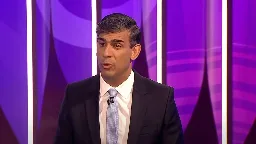
Rishi Sunak, the British Prime Minister, recently shocked the nation with a proposal reminiscent of social credit systems for the United Kingdom. The plan suggested restricting access to essential modern conveniences, like cars and financial services, for young individuals refusing to participate in National Service.
During a Thursday night national television forum, electoral party heads fielded audience questions on a BBC-hosted program.
Sunak found himself defending a novel electoral promise – the introduction of mandatory national service for British youths if he could retain his seat. Despite bleak poll evaluations and mounting public pressure, Sunak refused to accept the possibility of defeat.
The Prime Minister utilized the case of a volunteer ambulance service to illustrate potential forms of obligated volunteering. Nonetheless, the public’s worry and debates have predominantly revolved around the compulsory military aspect of National Service.
Sunak, however, sidestepped elaborating on how the government plans to coerce young individuals into the service, seemingly caught off guard when questioned directly about the compulsory factor. He hinted at the possibility of curtailing rights to essential modern living components, while conveniently passing the buck onto an unspecified “independent body.”
The Prime Minister did clarify that options were being evaluated following various European models, which might include restrictions on obtaining driving licenses and access to finance. Despite this, when questioned about the possibility of young individuals having their bank cards revoked for service refusal, he dismissed the suggestion laughingly, providing a negative reply.
“You will have a set of sanctions and incentives and we will look at the models that are existing in Europe to get the appropriate mix of those, there is a range of different options that exist… whether that’s looking at driving licenses, access to finance…” Sunak said.
This approach of using financial penalties and restrictions as a tool for enforcement is not new and has been gaining traction globally. The concept of a Central Bank Digital Currency (CBDC) could potentially simplify the implementation of such policies. A CBDC would provide governments with unprecedented control over the financial system, including the ability to directly enforce financial sanctions against individuals.
However, the use of financial controls to enforce government policies raises significant concerns regarding civil liberties. A prominent example is the actions taken by Canadian Prime Minister Justin Trudeau during the trucker protests in Canada. Trudeau invoked the Emergencies Act to freeze the bank accounts of civil liberties protesters.
- Free Speech at Risk: UN Pushes for Global "Hate Speech" Eradicationweb.archive.org Free Speech at Risk: UN Pushes for Global "Hate Speech" Eradication
Global censorship demands.
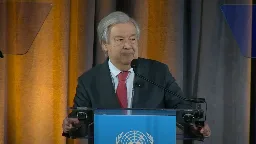
In a statement issued on the occasion of the “International Day for Countering Hate Speech,” UN Secretary-General Antonio Guterres called for the global eradication of so-called “hate speech,” which he described as inherently toxic and entirely intolerable.
The issue of censoring “hate speech” stirs significant controversy, primarily due to the nebulous and subjective nature of its definition. At the heart of the debate is a profound concern: whoever defines what constitutes hate speech essentially holds the power to determine the limits of free expression.
This power, wielded without stringent checks and balances, leads to excessive censorship and suppression of dissenting voices, which is antithetical to the principles of a democratic society.
Guterres highlighted the historic and ongoing damage caused by hate speech, citing devastating examples such as Nazi Germany, Rwanda, and Bosnia to suggest that speech leads to violence and even crimes against humanity.
“Hate speech is a marker of discrimination, abuse, violence, conflict, and even crimes against humanity. We have time and again seen this play out from Nazi Germany to Rwanda, Bosnia and beyond. There is no acceptable level of hate speech; we must all work to eradicate it completely,” Guterres said.
Guterres also noted what he suggested are the worrying rise of antisemitic and anti-Muslim sentiments, which are being propagated both online and by prominent figures.
Guterres argued that countries are legally bound by international law to combat incitement to hatred while simultaneously fostering diversity and mutual respect. He urged nations to uphold these legal commitments and to take action that both prevents hate speech and safeguards free expression.
The UN General Assembly marked June 18 as the “International Day for Countering Hate Speech” in 2021.
Guterres has long promoted online censorship, complaining about the issue of online “misinformation” several times, describing it as “grave” and suggesting the creation of an international code to tackle it.
His strategy involves a partnership among governments, tech giants, and civil society to curb the spread of “false” information on social media, despite risks to free speech.
- With Stanford Out, UW Steps Up for 2024 Election “Disinformation” Researchweb.archive.org With Stanford Out, UW Steps Up for 2024 Election “Disinformation” Research
Some things never change.

If it looks like a duck… and in particular, quacks like a duck, it’s highly likely a duck. And so, even though the Stanford Internet Observatory is reportedly getting dissolved, the University of Washington’s Center for an Informed Public (CIP) continues its activities. But that’s not all.
CIP headed the pro-censorship coalitions the Election Integrity Partnership (EIP) and the Virality Project with the Stanford Internet Observatory, while the Stanford outfit was set up shortly before the 2020 vote with the goal of “researching misinformation.”
The groups led by both universities would publish their findings in real-time, no doubt, for maximum and immediate impact on voters. For some, what that impact may have been, or was meant to be, requires research and a study of its own. Many, on the other hand, are sure it targeted them.
So much so that the US House Judiciary Committee’s Weaponization Select Subcommittee established that EIP collaborated with federal officials and social platforms, in violation of free speech protections.
What has also been revealed is that CIP co-founder and leader is one Kate Starbird – who, as it turned out from ongoing censorship and speech-based legal cases, was once a secret adviser to Big Tech regarding “content moderation policies.”
Considering how that “moderation” was carried out, namely, how it morphed into unprecedented censorship, anyone involved should be considered discredited enough not to try the same this November.
However, even as SIO is shutting down, reports say those associated with its ideas intend to continue tackling what Starbird calls online rumors and disinformation. Moreover, she claims that this work has been ongoing “for over a decade” – apparently implying that these activities are not related to the two past, and one upcoming hotly contested elections.
And yet – “We are currently conducting and plan to continue our ‘rapid’ research — working to identify and rapidly communicate about emergent rumors — during the 2024 election,” Starbird is quoted as stating in an email.
Not only is Starbird not ready to stand down in her crusade against online speech, but reports don’t seem to be able to confirm that the Stanford group is actually getting disbanded, with some referring to the goings on as SIO “effectively” shutting down.
What might be happening is the Stanford Internet Observatory (CIP) becoming a part of Stanford’s Cyber Policy Center. Could the duck just be covering its tracks?
- Attorney General Garland Targets "Conspiracy Theories" After Launching "Election Threats Task Force" with FBI, Sparking Censorship Concernsweb.archive.org Attorney General Garland Targets "Conspiracy Theories" After Launching "Election Threats Task Force" with FBI, Sparking Censorship Concerns
Critics argue Garland's op-ed is an indirect attempt to sway public opinion ahead of the November election.
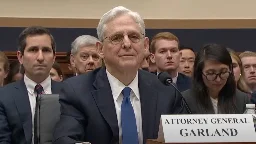
Some might see US Attorney General Merrick Garland getting quite involved in campaigning ahead of the November election – albeit indirectly so, as a public servant whose primary concern is supposedly how to keep Department of Justice (DoJ) staff “safe.”
And, in the process, he brings up “conspiracy theorists” branding them as undermining the judicial process in the US – because they dare question the validity of a particular judicial process that aimed at former President Trump.
In an opinion piece published by the Washington Post, Garland used one instance that saw a man convicted for threatening a local FBI office to draw blanket and dramatic conclusions that DoJ staff have never operated in a more dangerous environment, where “threats of violence have become routine.”
It all circles back to the election, and Garland makes little effort to present himself as neutral. Other than “conspiracy theories,” his definition of a threat are calls to defund the department that was responsible for going after the former president.
Ironically, while the tone of his op-ed and the topics and examples he chooses to demonstrate his own bias, Garland goes after those who claim that DoJ is politicized with the goal of influencing the election.
The attorney general goes on to quote “media reports” – he doesn’t say which, but one can assume those following the same political line – which are essentially (not his words) hyping up their audiences to expect more “threats.”
“Media reports indicate there is an ongoing effort to ramp up these attacks against the Justice Department, its work and its employees,” is how Garland put it.
And he pledged that, “we will not be intimidated” by these by-and-large nebulous “threats,” with the rhetoric at that point in the article ramped up to refer to this as, “attacks.”
Garland’s opinion piece is not the only attempt by the DoJ to absolve itself of accusations of acting in a partisan way, instead of serving the interests of the public as a whole.
Thus, Assistant Attorney General Carlos Uriarte wrote to House Republicans, specifically House Judiciary Chairman Jim Jordan, to accuse him of making “completely baseless” accusations against DoJ for orchestrating the New York trial of Donald Trump.
While, as it were, protesting too much, (CNBC called it “the fiery reply”) – Uriarte also went for the “conspiracy theory conspiracy theory”:
“The conspiracy theory that the recent jury verdict in New York state court was somehow controlled by the Department is not only false, it is irresponsible,” he wrote.
Garland and FBI Director Chris Wray recently discussed plans to counter election threats during a DoJ Election Threats Task Force meeting. Critics, suspicious of the timing with the upcoming election, cite the recent disbandment of the DHS Intelligence Experts Group.
- Meta to Censor "Hate Speech" Ahead of Euro 2024 and Olympics, Highlighting $20B Censorship Investmentsweb.archive.org Meta to Censor "Hate Speech" Ahead of Euro 2024 and Olympics, Highlighting $20B Censorship Investments
Various elections are not the only thing Big Tech is “protecting” this summer: athletes competing in major sporting events are another. Meta has announced that the “protection measures” that are to affect its apps (Facebook, Instagram, and, Threads) will also extend to the fans. Regardless of the wa...

Various elections are not the only thing Big Tech is “protecting” this summer: athletes competing in major sporting events are another.
Meta has announced that the “protection measures” that are to affect its apps (Facebook, Instagram, and, Threads) will also extend to the fans.
Regardless of the way Meta phrases it, the objective is clearly to censor what the giant decides is abusive behavior, bullying, and hate speech.
The events that draw Meta’s particular attention are the European football championship (EURO 2024), and the Olympic and Paralympic Games.
To prove how serious it is about implementing censorship in general, the company revealed an investment exceeding $20 billion that went into the “safety and security” segment (often resulting in unrestrained stifling of speech and deplatforming.)
Coincidentally or not, this investment began in 2016, and since then, what Meta calls its safety and security team went up to 40,000 members, with 15,000 used as “content reviewers.”
Before explaining how it’s going to “keep athletes and fans safe,” Meta also summed up the result of this spending and activities: 95% of whatever was deemed to be “hate speech” and similar has been censored before it even got reported, whereas some component of AI was used to automate issuing warnings to users that their comments “might be offensive.”
Now, Meta says that users will be allowed to turn off DM requests on Instagram, isolating themselves in this way from anyone they don’t follow. This is supposed to “protect” athletes presumably from unhappy fans, and there’s also “Hidden Words.”
“When turned on, this feature automatically sends DM requests — including Story replies — containing offensive words, phrases and emojis to a hidden folder so you don’t have to see them,” the blog post explained, adding, “It also hides comments with these terms under your posts.”
This is just one of the features on Facebook and Instagram that effectively allows people to use these platforms for influence and/or monetary gain, but without interacting with anyone they don’t follow, including indirectly via comments (that will be censored, aka, “moderated”).
Meta is not only out to “protect athletes,” but “educate” other users, this time on how to display “supportive behavior.” It doesn’t bode well that notoriously error-prone algorithms (AI) seem to have been given a key role in detecting “abusive” or “offensive” comments and then warning people they “may be breaking our rules.”
But this “training of users” works, according to Meta, that shared testing of what they refer to as interventions showed that “people edited or deleted their comment 50% of the time after seeing these warnings.”
- Trudeau Pushes Online Censorship Bill To "Protect" People From "Misinformation"web.archive.org Trudeau Pushes Online Censorship Bill To "Protect" People From "Misinformation"
Bill C-63 could dangerously expand government control over free speech and personal freedoms.

Canadian Prime Minister Justin Trudeau last week complained that governments have allegedly been left without the necessary tools to “protect people from misinformation.”
This “dire” warning came as part of Trudeau’s effort to have the Online Harms Act (Bill C-63) – one of the most controversial of its kind pieces of censorship legislation in Canada of late – pushed across the finish line in the country’s parliament.
C-63 has gained notoriety among civil rights and privacy advocates because of some of its provisions around “hate speech,” “hate propaganda,” and “hate crime.”
Under the first two, people would be punished before they commit any transgression, but also retroactively.
However, in a podcast interview for the New York Times, Trudeau defended C-63 as a solution to the “hate speech” problem, and clearly, a necessary “tool,” since according to this politician, other avenues to battle real or imagined hate speech and crimes resulting from it online have been exhausted.
Not one to balk at speaking out of both sides of his mouth, Trudeau at one point essentially admits that the more control governments have (and the bill is all about control, critics say, regardless of how its sponsors try to sugarcoat it) the more likely they are to abuse it.
He nevertheless goes on to declare that new legislative methods of “protecting people from misinformation” are needed and, in line with this, talk up C-63 as some sort of balanced approach to the problem.
But it’s difficult to see that “balance” in C-63, which is currently debated in the House of Commons. If it becomes law, it will allow the authorities to keep people under house arrest should they decide these people could somewhere down the line commit “hate crime or hate propaganda” – a chilling application of the concept of “pre-crime.”
These persons could also be banned from accessing the internet.
The bill seeks to not only produce a new law but also amend the Criminal Code and the Canadian Human Rights Act, and one of the provisions is no less than life in prison for those found to have committed a hate crime offense along with another criminal act.
As for hate speech, people whose statements run afoul of C-63 would face fines equivalent to some $51,000.
- Google Introduces App Store Censorship Rules, Bans AI Generating Various Types of "Restricted Content," Including "Hate Speech"web.archive.org Google Introduces App Store Censorship Rules, Bans AI Generating Various Types of "Restricted Content," Including "Hate Speech"
Also some content about "sensitive events."

Developers of apps for Android will have to adhere to a new set of rules if they wish to publish on the Google Play Store.
The “guidance” is seen by critics as yet another wave of sweeping censorship tied to AI, as Google continues to crack down on what it considers to be hate speech, profanity, bullying, harassment, and other content listed as “restricted.”
One of the types of content developers are now banned from generating refers to sensitive events – and Google’s description is another example of what is likely a deliberately vague definition, so it can be left open to arbitrary interpretation.
Namely, this is content about sensitive events that include things that “capitalize on or are insensitive toward a sensitive event with significant social, cultural, or political impact.”
In its support pages, Google is telling developers that the intent behind the new policies is to make sure AI-generated content is “safe for all users.” And, the giant wants to make sure developers allow users to flag what they see as offensive, and incorporate that “feedback” for the sake of “responsible innovation.”
According to the rules, developers are instructed to utilize user reports “to inform content filtering and moderation in their apps.”
Google also gives examples of what is covered by the restrictions: AI chatbots, which are the central feature of the app, as well as AI-generated images based on text, images, or voice prompts.
The full range of restricted content categories are listed and described on the “Inappropriate Content” page. These are: sexual content and profanity, hate speech (with the note that even educational, scientific, and documentary content about Nazis may result in an app getting blocked “in certain countries”).
There is also violence and violent extremism (this includes terrorist “or other dangerous organizations”), sensitive events, bullying and harassment, and apps that facilitate sales of dangerous products (such as firearms and firearms accessories), marijuana, tobacco, and alcohol.
- Russian Twitch Star Jailed for Criticizing War in Ukraineweb.archive.org Russian Twitch Star Jailed for Criticizing War in Ukraine
Her case underscores the rising consequences for dissent in Russia amid the Ukraine conflict.

As part of the escalating crackdown on free speech in Russia, Twitch streamer Anna Bazhutova, known online as “Yokobovich,” has been condemned to a prison term of five and a half years. Her offense? Criticizing the Russian military’s actions in Ukraine.
Arrested in 2023, Bazhutova, a popular figure on the streaming platform with over 9,000 followers, faced charges for her broadcasts that included witness accounts of atrocities by Russian forces in the Ukrainian city of Bucha.
According to The Moscow Times, the court’s decision came down this month, with Bazhutova found guilty of “spreading false information” about military operations, a charge under Article 207.3 of Russia’s criminal code that can attract a sentence as severe as 15 years. Despite the severe potential maximum, Bazhutova’s sentence was set at just over a third of this possible duration.
Details surrounding the exact timing of the incriminating broadcast are murky, with sources citing either 2022 or 2023 as the year it occurred. Nevertheless, the impact was immediate and severe, drawing ire from authorities and leading to her arrest. Before her trial, Russian police raided her home, seizing electronic devices and detaining Bazhutova, who has been in custody since August 2023.
Her troubles with authorities were compounded in March 2023 when her Twitch channel was abruptly banned, something Twitch is yet to comment on.
Bazhutova’s case is not an isolated incident but part of a broader pattern of punitive measures against those who speak out against the Russian state’s actions in Ukraine.
- Meta to Focus on Censoring "Misinformation" and "Hate Speech" Ahead of UK Electionweb.archive.org Meta to Focus on Censoring "Misinformation" and "Hate Speech" Ahead of UK Election
Who gets to decide what's "misinformation?"

As the UK prepares for its General Election on July 4th, Meta has announced a series of measures aimed at combating “misinformation” and “hate speech” on its platforms. While the tech giant frames these initiatives as necessary steps to ensure the integrity of the election, critics argue that Meta’s efforts may actually hinder free speech and stifle legitimate political debate.
Meta’s announcement highlights a multi-faceted approach, supposedly drawing on lessons from over 200 elections since 2016 and aligning with the UK’s controversial censorship law, the Online Safety Act.
The company’s track record raises questions about its ability to impartially police content. Critics argue that Meta’s definition of “misinformation” is often too broad and subjective, leading to the removal of legitimate political discourse. By relying on third-party fact-checkers like Full Fact and Reuters, who have their own biases, as everyone does, in the types of content they choose to “fact check,” Meta risks becoming an arbiter of truth, silencing voices that may challenge mainstream narratives.
Meta’s plan to tackle influence operations, including coordinated inauthentic behavior and state-controlled media, sounds, to some, laudable on the surface, the broad and opaque criteria used to determine what constitutes harmful influence could easily be misapplied, leading to the suppression of legitimate outlets that offer alternative perspectives.
The company has faced significant criticism for its handling of misinformation, raising serious concerns about its ability to effectively moderate content. Meta’s handling of the Hunter Biden laptop story in the lead-up to the 2020 US presidential election exacerbated concerns about its content moderation policies. When the New York Post published a story about Hunter Biden’s alleged involvement in questionable overseas business dealings, Meta moved swiftly to limit the spread of the story on its platforms, citing its policy against the dissemination of potentially hacked materials. This decision was widely criticized as a politically motivated act of censorship, particularly after it was revealed that the laptop and its contents were genuine. The suppression of this story fueled accusations of bias and raised questions about the extent to which Meta was willing to go to control the narrative in sensitive political contexts.
Meta’s initiatives are said to protect candidates from “hate speech” and “harassment.” However, the application of these policies often appears inconsistent. Public figures, particularly those with views that are controversial to Big Tech, might find themselves disproportionately targeted by Meta’s enforcement actions.
This selective protection can skew public perception and unfairly disadvantage certain candidates, affecting the democratic process.
- 'New China laws risky for Taiwanese’ with many have been detained or interrogated, while Taipei warns that Chinese authorities can from next month confiscate cellphoneswww.taipeitimes.com ‘New China laws risky for Taiwanese’ - Taipei Times
Bringing Taiwan to the World and the World to Taiwan

Taiwanese who are traveling to China for religious, business or other non-political purposes can all be interrogated by Chinese national security officers due to new national security laws, the Mainland Affairs Council (MAC) said in a recent report.
Starting next month, Taiwanese could also be asked to hand over their mobile phones and electronic devices for national security inspections when visiting China, the council said.
Beijing has introduced a series of laws that were designed to impose heavier sanctions on people who are considered enemies of the state.
An amendment to China’s Anti-Espionage Law, which took effect in July last year, expanded the definition of “espionage,” while a new law on guarding state secrets, which was enacted last month, allows the Chinese government to arrest people who are accused of leaking state secrets without following legal procedures.
From next month, municipal-level national security agencies are authorized to issue inspection notices for electronic devices owned by individuals and organizations, while national security officers are allowed to seize electronic devices if the devices contain evidence indicating possible contraventions of national security regulations and that further investigation is required.
Also starting next month, Chinese law enforcement officers who properly identify themselves as police or investigators can search a person’s items if they suspect they are a threat to national security.
They can also secure a search warrant issued by a municipal-level national security agency to search individuals, their personal belongings and facilities with which they are affiliated. People under investigation for national security issues can be asked to sign a non-disclosure agreement if necessary.
Information gathered by the MAC showed that Taiwanese of any profession — college professors, borough wardens, tourists, business personnel or even people traveling for religious purposes — might experience improper treatment and could risk “losing their personal freedom” when visiting China.
In one case, a borough warden who used to be a police officer was asked by Chinese national security personnel to hand over their mobile phone for inspection at the hotel they were staying at, the MAC said, adding that they backed up the phone records as proof.
Another case involved a Taiwanese who had compared the political systems in Taiwan and China online and praised Taiwan for being a democratic and free country.
The person was briefly detained by Chinese customs officers and asked what the purpose of their visit to China was, the MAC said.
Taiwanese doing business in China are not subject to more lenient scrutiny from national security personnel either, the council said.
A Taiwanese employee working for a Taiwanese firm in China was warned not to make any more comments about China’s high youth unemployment rate or economic downturn after being questioned by security personnel for hours, the MAC said.
A Taiwanese working as a chief executive in the Chinese branch of a Taiwanese firm was asked about their political leanings upon arrival, while the chairperson of a private association was interrogated about the association’s operations, the council said.
Meanwhile, an adherent of Yiguandao, which is classified by Beijing as a salvationist religious sect, is still being detained for allegedly breaking the law by bringing books promoting vegetarian food to China, it said.
Some managers of Taiwanese temples reported that they had been asked to provide their personal information and reveal what political parties they supported upon arriving in China, the MAC said.
Some Taiwanese teaching at Chinese universities were asked about their political leanings and who they voted for in the presidential election in January, and Chinese national security officers inspected their laptops and mobile phones.
Some political party members have even been detained until they provide details of how their parties operate, the MAC said.
- EU Targets Telegram: Could the Messaging App Face New Censorship Orders?web.archive.org EU Targets Telegram: Could the Messaging App Face New Censorship Orders?
Regulators push to declare Telegram a very large online platform, enabling control over content under the new censorship law.

The European Union is eager to pull Telegram into the realm of its online censorship law, the Digital Services Act (DSA), by declaring that it has enough users to be considered a very large online platform (VLOP) – which DSA can then regulate.
The messaging app’s numbers from February said that it had 41 million monthly active users in the EU’s 27 member countries. But if the EU could find a way to officially push that statistic up to 45 million, then it could subject Telegram to a host of strict DSA rules. And to this end, an “investigation” has reportedly been launched.
The bloc is “in discussion” with those behind the app, unnamed sources have told Bloomberg. What exactly they might be discussing isn’t clear at this time, but Telegram no longer mentions the DSA on its ToS pages, while the one that provided the 41 million figure has been removed from the site.
Telegram has long been a thorn in the side of censorship-prone authorities around the world, and the EU – some of its member countries more so than others – is no different.
Although not as large and influential as Facebook, Google, or even X, unlike these platforms, it remains “unmoderated” and “unaccountable” – i.e., governments who like to suppress online speech on a whim have a hard time trying to achieve this on apps like Telegram.
The EU’s main concern seems to be to fully control the narrative around the ongoing conflict in Ukraine, and be able to block content published by Russian channels as “disinformation” – having long since censored traditional media and platforms based in that country.
The EU appears to be trying to now control Telegram’s reach by “investigating” the number of users it has, and if it finds (or decides) that there are more than 45 million of them in the bloc, the next step would be to try and impose DSA rules on the app.
EU’s punishment for those found in violation of those rules ranges from fines amounting to 6 percent of revenue, to the banning of a platform.
- Google Tightens Influence on UK Elections with New "Moderation" Tacticsweb.archive.org Google Tightens Influence on UK Elections with New "Moderation" Tactics
The tech giant's new measures aim to combat "misinformation" but raise concerns over increased censorship and control.

Google has found itself yet another election to “support.”
After the company made announcements to this effect related to the EU (European Parliament) June ballot, voters in the UK can now also look forward to – or dread, as the case may be – the tech giant’s role in their upcoming general election.
A blog post by Google UK Director of Government Affairs and Public Policy Katie O’Donovan announced even more “moderation” and a flurry of other measures, most of which have become tried-and-tested instruments of Google’s censorship over the past years.
They are divided in three categories – pushing (“surfacing”) content and sources of information picked by Google as authoritative and of high quality, along with YouTube information panels, investing in what it calls Trust & Safety operations, as well as “equipping campaigns with the best-in-class security tools and training.”
Another common point is combating “misinformation” – together with what the blog post refers to as “the wider ecosystem.” That concerns Google News Initiative and PA Media, a private news agency, and their Election Check 24, which is supposed to safeguard the UK election from “mis- and dis-information.”
Searches related to voting are “rigged” to return results manipulated to boost what Google considers authoritative sources – notably, the UK government’s site.
As for AI, the promise is that users of Google platforms will receive “help navigating” that type of content.
This includes the obligation for advertisers to reveal that ads “include synthetic content that inauthentically depicts real or realistic-looking people or events” (this definition can easily be stretched to cover parody, memes, and similar).
“Disclosure” here, however, is still differentiated from Google’s outright ban on manipulated media that it decides “misleads people.” Such content is labeled, and banned if considered as having the ability to maybe pose “a serious risk of egregious harm.”
And then there’s Google’s AI chatbot Gemini, which the giant has restricted in terms of what types of election-related queries it will respond to – once again, as a way to root out “misinformation” while promoting “fairness.”
This falls under what the company considers to be “a responsible approach to generative AI products.”
But as always, AI is also seen as a “tool for good” – for example, when it allows for building “faster and more adaptable enforcement systems.”
- The EU is on the Brink off Making “Hate Speech” a Serious Crimereclaimthenet.org The EU is on the Brink off Making “Hate Speech” a Serious Crime
The EU’s European Commission (EC) appears to be preparing to include “hate speech” among the list of most serious criminal offenses and regulate its investigation and prosecution across the bloc. Whether this type of proposal is cropping up now because of the upcoming EU elections or if the initiati...
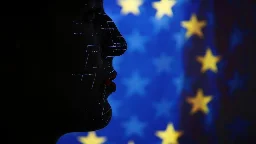
The EU’s European Commission (EC) appears to be preparing to include “hate speech” among the list of most serious criminal offenses and regulate its investigation and prosecution across the bloc.
Whether this type of proposal is cropping up now because of the upcoming EU elections or if the initiative has legs will become obvious in time, but for now, the plans are supported by several EC commissioners.
The idea stems from the European Citizens’ Panel on Tackling Hatred in Society, one of several panels (ECPs) established to help EC President Ursula von der Leyen with her (campaign?) promise of ushering in a democracy in the EU that is “fit for the future.”
That could mean anything, and the vagueness by no means stops there: the very “hate speech,” despite the gravity of the proposals to classify it as a serious crime, is not even well defined, observers are warning.
Despite that, the recommendations contained in a report produced by the panel have been backed by EC’s Vice-President for Values and Transparency Vera Jourova as well as Vice President for Democracy and Demography Dubravka Suica.
According to Jourova, the panel’s recommendations on how to deal with “hate speech” are “clear and ambitious” – although, as noted, a clear definition of that type of speech is still be lacking.
This is the wording the report went for: any speech that is “incompatible with the values of human dignity, freedom, democracy, the rule of law, and respect of human rights” should be considered as “hate speech.”
Critics of this take issue with going for, in essence, subjective, not to mention vague expressions like “values of human dignity” considering that even in Europe, speech can still be lawful even if individuals or groups perceive it as offensive or upsetting.
Since there is also hate speech that is already illegal in the EU, the panel wants it to receive a new definition, and the goal, the report reads, is to “ensure that all forms of hate speech are uniformly recognized and penalized, reinforcing our commitment to a more inclusive and respectful society.”
If the EU decides to add hate speech to its list of crimes, the panel’s report added, this will allow for the protection of marginalized communities, and “uphold human dignity.”
Noteworthy is that the effort seems coordinated, even as far as the wording goes, as media reports note that the recommendation “adopts exactly the same terminology as an EC proposal that was recently endorsed by the European Parliament to extend the list of EU-wide crimes to include ‘hate speech’.”
- Alternative Media Giants Sue The Censorship Industrial Complexreclaimthenet.org Alternative Media Giants Sue The Censorship Industrial Complex
The suit alleges a coordinated effort to suppress dissenting voices on platforms like NaturalNews.com and Brighteon.com, claiming substantial economic and reputational harm.

In a new lawsuit, Webseed and Brighteon Media have accused multiple US government agencies and prominent tech companies of orchestrating a vast censorship operation aimed at suppressing dissenting viewpoints, particularly concerning COVID-19. The plaintiffs, Webseed and Brighteon Media, manage websites like NaturalNews.com and Brighteon.com, which have been at the center of controversy for their alternative health information and criticism of government policies.
We obtained a copy of the lawsuit for you here.
The defendants include the Department of State, the Global Engagement Center (GEC), the Department of Defense (DOD), the Department of Homeland Security (DHS), and tech giants such as Meta Platforms (formerly Facebook), Google, and X. Additionally, organizations like NewsGuard Technologies, the Institute for Strategic Dialogue (ISD), and the Global Disinformation Index (GDI) are implicated for their roles in creating and using tools to label and suppress what they consider misinformation.
Allegations of Censorship and Anti-Competitive Practices:
The lawsuit claims that these government entities and tech companies conspired to develop and promote censorship tools to suppress the speech of Webseed and Brighteon Media, among others. “The Government was the primary source of misinformation during the pandemic, and the Government censored dissidents and critics to hide that fact,” states Stanford University Professor J. Bhattacharya in support of the plaintiffs’ claims.
The plaintiffs argue that the government’s efforts were part of a broader strategy to silence voices that did not align with official narratives on COVID-19 and other issues. They assert that these actions were driven by an “anti-competitive animus” aimed at eliminating alternative viewpoints from the digital public square.
According to the complaint, the plaintiffs have suffered substantial economic harm, estimating losses between $25 million and $50 million due to reduced visibility and ad revenue from their platforms. They also claim significant reputational damage as a result of being labeled as purveyors of misinformation.
The complaint details how the GEC and other agencies allegedly funded and promoted tools developed by NewsGuard, ISD, and GDI to blacklist and demonetize websites like NaturalNews.com. These tools, which include blacklists and so-called “nutrition labels,” were then utilized by tech companies to censor content on their platforms. The plaintiffs argue that this collaboration between government agencies and private tech companies constitutes an unconstitutional suppression of free speech.
A Broader Pattern of Censorship:
The lawsuit references other high-profile cases, such as Missouri v. Biden, to illustrate a pattern of government overreach into the digital information space. It highlights how these efforts have extended beyond foreign disinformation to target domestic voices that challenge prevailing government narratives.
Webseed and Brighteon Media are seeking both monetary damages and injunctive relief to prevent further censorship. They contend that the government’s actions violate the First Amendment and call for an end to the use of these censorship tools.
As the case progresses, it promises to shine a light on the complex interplay between government agencies, tech companies, and the tools used to control the flow of information in the digital age. The outcome could have significant implications for the future of free speech and the regulation of online content.
- European Council Approves “Rapid Response Teams” To Combat “Disinformation”reclaimthenet.org European Council Approves “Rapid Response Teams” To Combat “Disinformation”
Critics warn of potential censorship as Ireland considers early adoption of EU's controversial "disinformation" crackdown.

The EU has announced a guiding framework that will make it possible to set up what the bloc calls “Hybrid Rapid Response Teams” which will be “drawing on relevant sectoral national and EU civilian and military expertise.”
These teams will be created and then deployed to counter “disinformation” throughout the 27 member countries – but also to what Brussels calls partner countries. And Ireland might become an “early adopter.”
For a county to apply, it will first need to feel it is under attack by means of “hybrid threats and campaigns” and then request from the EU to help counter those by dispatching a “rapid response team.”
The EU is explaining the need for these teams as a result of a “deteriorating security environment, increasing disinformation, cyber attacks, attacks on critical infrastructure, and election interference by malign actors” – and even something the organization refers to as “instrumentalized migration.”
The framework comes out of the EU Hybrid Toolbox, which itself stems from the bloc’s Strategic Compass for Security and Defense.
Mere days after the EU made the announcement last week, news out of Ireland said that the Department of Foreign Affairs welcomed the development, stating that they will “now begin on operationalizing Ireland’s participation in this important initiative.”
The department explained what it sees as threats – there’s inevitably “disinformation,” along with cyber attacks, attacks on critical infrastructure, as well as “economic coercion.”
Ireland’s authorities appear to be particularly pleased with the EU announcement given that the country doesn’t have a centralized body that would fight such a disparate range of threats, real or construed.
The announcement about the “reaction teams” came from the Council of the EU, and was the next day “welcomed” by the European Commission, which repeated the points the original statement made about a myriad of threats.
The Hybrid Rapid Response Teams which have now been greenlit with the framework are seen as a key instrument in countering those threats.
Other than saying that the EU Hybrid Toolbox relies on “relevant civilian and military expertise,” the two EU press releases are short on detail about the composition of the future teams that will be sent on “short-term” missions.
However, it revealed that “rapid deployment to partner countries” will be made possible through the Emergency Response Coordination Center (ERCC) as the scheme’s operational hub.
- Global Elections Face Growing Censorship Threat: The Rise of "Prebunking"reclaimthenet.org Global Elections Face Growing Censorship Threat: The Rise of "Prebunking"
Censorship proponents now turn to "prebunking," a controversial strategy aimed at curbing so-called disinformation before it reaches the public eye.

The feverish search for the next “disinformation” silver bullet continues as several elections are being held worldwide.
Censorship enthusiasts, who habitually use the terms “dis/misinformation” to go after lawful online speech that happens to not suit their political or ideological agenda, now feel that debunking has failed them.
(That can be yet another euphemism for censorship – when “debunking” political speech means removing information those directly or indirectly in control of platforms don’t like.)
Enter “prebuking” – and regardless of how risky, especially when applied in a democracy, this is, those who support the method are not swayed even by the possibility it may not work.
Prebunking is a distinctly dystopian notion that the audiences and social media users can be “programmed” (proponents use the term, “inoculated”) to reject information as untrustworthy.
To achieve that, speech must be discredited and suppressed as “misinformation” (via warnings from censors) before, not after it is seen by people.
“A radical playbook” is what some legacy media reports call this, at the same time implicitly justifying it as a necessity in a year that has been systematically hyped up as particularly dangerous because of elections taking place around the globe.
The Washington Post disturbingly sums up prebunking as exposing people to “weakened doses of misinformation paired with explanations (…) aimed at helping the public develop ‘mental antibodies’.”
This type of manipulation is supposed to steer the “unwashed masses” toward making the right (aka, desired by the “prebunkers”) conclusions, as they decide who to vote for.
Even as this is seen by opponents as a threat to democracy, it is being adopted widely – “from Arizona to Taiwan (with the EU in between)” – under the pretext of actually protecting democracy.
Where there are governments and censorship these days, there’s inevitably Big Tech, and Google and Meta are mentioned as particularly involved in carrying out prebunking campaigns, notably in the EU.
Apparently Google will not be developing Americans’ “mental antibodies” ahead of the US vote in November – that might prove too controversial, at least at this point in time.
The risk-reward ratio here is also unappealing.
“There aren’t really any actual field experiments showing that it (prebunking) can change people’s behavior in an enduring way,” said Cornell University psychology professor Gordon Pennycook.
- Lawmakers Push for the Censorship of "Harmful Content," "Disinformation" in Latest Section 230 Reform Pushreclaimthenet.org Lawmakers Push for the Censorship of "Harmful Content," "Disinformation" in Latest Section 230 Reform Push
Threatening to sunset Section 230 unless platforms agree to wider censorship demands.
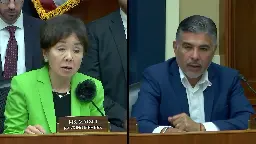
Section 230 of the Communications Act (CDA), an online liability shield that prevents online apps, websites, and services from being held civilly liable for content posted by their users if they act in “good faith” to moderate content, provided the foundation for most of today’s popular platforms to grow without being sued out of existence. But as these platforms have grown, Section 230 has become a political football that lawmakers have used in an attempt to influence how platforms editorialize and moderate content, with pro-censorship factions threatening reforms that force platforms to censor more aggressively and pro-free speech factions pushing reforms that reduce the power of Big Tech to censor lawful speech.
And during a Communications and Technology Subcommittee hearing yesterday, lawmakers discussed a radical new Section 230 proposal that would sunset the law and create a new solution that “ensures safety and accountability for past and future harm.”
We obtained a copy of the draft bill to sunset Section 230 for you here.
In a memo for the hearing, lawmakers acknowledged that their true intention is “not to have Section 230 actually sunset” but to “encourage” technology companies to work with Congress on Section 230 reform and noted that they intend to focus on the role Section 230 plays in shaping how Big Tech addresses “harmful content, misinformation, and hate speech” — three broad, subjective categories of legal speech that are often used to justify censorship of disfavored opinions.
And during the hearing, several lawmakers signaled that they want to use this latest piece of Section 230 legislation to force social media platforms to censor a wider range of content, including content that they deem to be harmful or misinformation.
Rep. Doris Matsui (D-CA) acknowledged that Section 230 “allowed the internet to flourish in its early days” but complained that it serves as “a haven for harmful content, disinformation, and online harassment.”
She added: “The role of Section 230 needs immediate scrutiny, because as it exists today, it is just not working.”
Rep. John Joyce (R-PA) suggested Section 230 reforms are necessary to protect children — a talking point that’s often used to erode free speech and privacy for everyone.
“We need to make sure that they [children] are not interacting with harmful or inappropriate content,” Rep. John Joyce (R-PA) said. “And Section 230 is only exacerbating this problem. We here in Congress need to find a solution to this problem that Section 230 poses.”
Rep. Tony Cárdenas (D-CA) complained that platforms aren’t doing enough to combat “outrageous and harmful content” and “harmful mis-and-dis-information”: >“While I wish we could better depend on American companies to help combat these issues, the reality is that outrageous and harmful content helps drive their profit margins. That’s the online platforms. >I’ll also highlight, as I have in previous hearings, that the problem of harmful mis-and-dis-information online is even worse for users who speak Spanish and other languages outside of English as a result of platforms not making adequate investments to protect them.”
Rep. Debbie Dingell (D-MI) also signaled an intent to use Section 230 reform to target “false information” and claimed that Section 230 has allowed platforms to “evade accountability for what occurs on their platforms.”
Rep. Buddy Cater (R-GA) framed Section 230 as “part of the problem” because “it’s kind of set a free for all on the Internet” when pushing for reform.
While several lawmakers were in favor of Section 230 reforms that pressure platforms to moderate more aggressively, one of the witnesses, Kate Tummarello, the Executive Director at the advocacy organization Engine, did warn that these efforts could lead to censorship.
“It’s not that the platforms would be held liable for the speech,” Tummarello said. “It’s that the platforms could very easily be pressured into removing speech people don’t like.”
You can watch the full hearing here.
- Online Speech Protections For Everyone Are In Dangeract.eff.org Online Speech Protections For Everyone Are In Danger
Some members of Congress want to delete Section 230, the key law underpinning free speech online. Even though this law has protected millions of Americans’ right to speak out and organize for decades, the House is now debating a proposal to “sunset” the law after 18 months. Section 230 reflects valu...
Some members of Congress want to delete Section 230, the key law underpinning free speech online. Even though this law has protected millions of Americans’ right to speak out and organize for decades, the House is now debating a proposal to “sunset” the law after 18 months.
Section 230 reflects values that most Americans agree with: you’re responsible for your own speech online, but, with narrow exceptions, not the speech of other people. This law protects every internet user and website host, from large platforms down to the smallest blogs. If Congress eliminates Section 230, we’ll all be less free to create art and speak out online.
Section 230 says that online services and individual users can’t be sued over the speech of other users, whether that speech is in a comment section, social media post, or a forwarded email. Without Section 230, it's likely that small platforms and Big Tech will both be much more likely to remove our speech, out of fear it offends someone enough to file a lawsuit.
Section 230 also protects content moderators who take actions against their site’s worst or most abusive users. Sunsetting Section 230 will let powerful people or companies constantly second-guess those decisions with lawsuits—it will be a field day for the worst-behaved people online.
The sponsors of this bill, Reps. Cathy McMorris Rodgers (R-WA) Frank Pallone (D-NJ), claim that if it passes, it will get Big Tech to come to the table to negotiate a new set of rules around online speech. Here’s what supporters of this bill don’t get: everyday users don’t want Big Tech to be in Washington, working with politicians to rewrite internet speech law. That will be a disaster for us all.
We need your help to tell all U.S. Senators and Representatives to oppose this bill, and vote no on it if it comes to the floor.
- EU's Von der Leyen Calls for More Censorship Amid Re-Election Campaignreclaimthenet.org EU's Von der Leyen Calls for More Censorship Amid Re-Election Campaign
Von der Leyen's push for the "European Democracy Shield" raises censorship and bias concerns ahead of reelection bid.
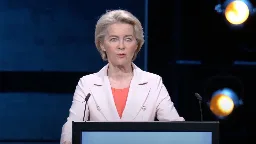
European Commission President Ursula von der Leyen is campaigning to get reelected (by the next European Parliament, EP) and her messaging ahead of EP elections next month unsurprisingly includes doubling down on the policy of “combating disinformation.”
But in the same breath, the EU bureaucrat was not shy to make unsubstantiated accusations against some European politicians – specifically the opposition in her native Germany, that’s rapidly gaining in popularity – describing them as being “in the pockets of Russia.”
She also pledged that the European Commission under her continued leadership will make “European Democracy Shield” a priority.
This is supposed to be a new body coordinating EU member-countries’ national agencies as they search for “information and manipulation.”
“Better information and threat intelligence sharing” is given as the entity’s key role, while it will be modeled after Sweden’s Psychological Defense Agency.
Von der Leyen proceeded to show a poor understanding of the concepts of misinformation, cyber attacks, and extremism, conflating them while warning of foreign influence and manipulation.
“It is about confusing people so they don’t know who to believe or if they can even believe anyone at all” – she said, although her own statements can be read as achieving just that effect.
The European Commission president went on to praise the Digital Services Act, a controversial censorship law, and spoke about the need for the bloc to be “very vigilant and uncompromising when it comes to ensuring that it is properly enforced.”
“We have already made progress with the DSA…so once we have detected malign information or propaganda, we need to ensure that it is swiftly removed and blocked,” von der Leyen said.
Von der Leyen covered most of the censorship bases in her speech, including by pushing for the dystopian mechanism of “prebunking” – where citizens are in advance “warned” (“inoculated”) by the censors about supposed misinformation, in order to influence how they perceive information.
“Pre-bunking is much more successful than debunking,” she said. “Pre-bunking is basically the opposite of debunking… It is much better to vaccinate so that the body is inoculated.”
- Unpacking Canada’s Controversial Push to Police the Digital Worldreclaimthenet.org Unpacking Canada’s Controversial Push to Police the Digital World
Canada's new bill is a slide into more censorship, with penalties as severe as imprisonment for retroactive "hate speech."

The latest of Canada’s speech-restricting legislative efforts, the Online Harms Act (Bill C-63) was introduced and promoted earlier in the year by Prime Minister Justin Trudeau as necessary primarily to protect children and vulnerable population categories on the internet.
The actual text of the bill, however, reveals broad implications, including sweeping censorship and draconian penalties, as yet another country pushes such measures under the “think of the children” banner.
We obtained a copy of the bill for you here.
And here, the message was “garnished” with Trudeau’s early assurances that the bill would be focused on the stated goals.
But upon closer inspection, several controversial provisions have emerged, making Bill C-63 opponents liken it to all manner of dystopian concepts, from “1984” to “Minority Report.”
One of them, addressing “Continuous Communication” (Section 13-2) could see Canada’s Charter of Freedoms violated by retroactively censoring speech, i.e., punishing “perpetrators” for content posted before the new law, that defines it an offense, gets enacted.
The bill states that, “a person communicates or causes to be communicated hate speech so long as the hate speech remains public and the person can remove or block access to it.”
Critics believe that this paves the way for the clause to be used retroactively against those who fail to remove their past statements from the internet.
This could become both a tool of censorship and an intimidation tactic aimed at suppressing future speech, by demonstrating what happens to those found in violation of the law.
And what can happen to them is by no means trivial: life imprisonment is envisaged as a possible punishment for “any offense motivated by hatred.”
This is an example of the bill’s astonishingly overbroad nature, where interpretations of what “hatred motivated offense” is can range from advocating genocide, to a misdemeanor that is found to have been committed “with hateful intent.”
More dystopian concepts are woven into the text, such as “pre-crime” – and this could land people in jail for up to a year or put them under house arrest. That’s jail time for a “hate crime” that was never committed.
Meanwhile, online platforms are required to swiftly, in some cases in under 24 hours, remove content Canadian authorities label as harmful, or risk fines of up to 6 percent of their gross global revenue.
- YouTube Removes 35,000 EU Videos for "Misinformation," Enhances Content Censorship Ahead of 2024 Electionsreclaimthenet.org YouTube Removes 35,000 EU Videos for "Misinformation," Enhances Content Censorship Ahead of 2024 Elections
YouTube amps up its election role in the EU, blending voter information with a robust crackdown on what it deems misinformation. What could possibly go wrong?

YouTube has (“voluntarily” or otherwise) assumed the role of a private business entity that “supports elections.”
Google’s video platform detailed in a blog post how this is supposed to play out, in this instance, in the EU.
With the European Parliament (EP) election just around the corner, YouTube set out to present “an overview of our efforts to help people across Europe and beyond find helpful and authoritative election news and information.”
The overview is the usual hodgepodge of reasonable concepts, such as promoting information on how to vote or register for voting, learning about election results, etc., that quickly morph into yet another battle in the “war on disinformation.”
And what better way to “support” an election (and by extension, democracy) – than to engage in another round of mass censorship? /s
But YouTube was happy to share that in 2023 alone, it removed 35,000 videos uploaded in the EU, having decided that this content violated the platform’s policies, including around what the blog post calls “certain types of elections misinformation” (raising the logical question if some types of “election misinformation” might be allowed).
As for who is doing this work, YouTube suggests it is a well-oiled machine hard at it around the clock, and “at scale” – made up of “global teams of reviewers” and machine learning algorithms.
The blog post first states that one of the goals of YouTube’s efforts is to help users “learn about the issues shaping the debate.” But then in the part of the article that goes into how the platform is “dealing with harmful content,” it at one point starts to look like the giant might be trying to shape that debate itself.
“Our Intelligence Desk has also been working for months to get ahead of emerging issues and trends that could affect the EU elections, both on and off YouTube,” reads the post.
In case somebody missed the point, YouTube reiterates it: “This helps our enforcement teams to address these potential trends before they become larger issues.”
And while machine learning (aka, AI) is mentioned as a positive when it comes to powering YouTube’s ability to censor at scale, later on in the post the obligatory mention is made of AI as a tool potentially dangerous to elections and democracy.
YouTube also states that coordinated influence campaigns are banned on the platform – and promises that this is true “regardless of the political viewpoints they support.”
And when Google’s Threat Analysis Group (TAG) decides it has spotted such a campaign, this information is shared with law enforcement, including EUROPOL.
- Rumble Is Blocked in Russia After Refusing Censorship Requests, CEO Saysreclaimthenet.org Rumble Is Blocked in Russia After Refusing Censorship Requests, CEO Says
Rumble vs. Russia: The video platform is blocked for refusing censorship, raising questions about other tech giants' compliance.

The Russian government has officially blocked access to the video-sharing platform Rumble, following the company’s refusal to comply with demands for censorship. That’s according to Chris Pavlovski, CEO of Rumble, who confirmed the news, highlighting the platform’s commitment to free speech and its refusal to bend to external pressures.
“Russia has officially blocked Rumble because we refused to comply with their censorship demands,” Pavlovski stated. He pointed out the apparent contradiction in the treatment of different tech companies, noting, “Ironically, YouTube is still operating in Russia, and everyone needs to ask what Russian demands Google and YouTube are complying with?”
The block comes amid heightened tensions over internet freedoms in Russia. The government has been tightening its grip on online content, demanding that platforms remove or block content it deems politically sensitive or harmful.
This action against Rumble raises questions about the operations of other tech giants in the country, notably YouTube. The Google-owned video service continues to operate, suggesting it may be meeting Russian regulatory demands that Rumble has rejected.
In a revealing X Spaces interview, Pavlovski elaborated on the recent decision by Russia to block the platform, a move he connects to the company’s firm stance against censorship demands. Pavlovski drew parallels between current events and past challenges, notably referencing a similar situation in France.
“Two years ago we left France; they threatened to turn us off at the telco level so we decided to make the decision to leave the country entirely,” Pavlovski said. France was demanding that Rumble shut down Russian news sources. Pavlovski highlighted the significant media attention this decision received previously, which contrasts sharply with the current underreporting of Rumble’s ban in Russia. “And every single paper in the United States and in Canada covered how we were allowing Russian news sources on Rumble,” he added.
Pavlovski detailed that Rumble had received multiple requests from the Russian government to censor various channels, which did not violate their terms of service. He listed the types of content involved: “One of the accounts was with respect to marijuana, another seemed to be like some kind of conspiracy channel… And the other channel seemed to be an Arabic channel that was political…”
By refusing these demands, Rumble was subsequently made inaccessible within Russia. Pavlovski emphasized the implications for other platforms still operating in Russia, raising questions about their compliance. “Rumble has been the tip of the spear when it comes to free expression… So what does that mean? Are [other platforms] complying with every single request that comes? Or what is exactly happening? I think that’s a really important question that everyone needs to ask because obviously Rumble is not as big as YouTube.”
Pavlovski mentioned that they suspected for about a month that Russia was blocking Rumble, but it was only confirmed this week: “It might have happened about a month ago, but we confirmed that Russia has put Rumble on a block list and we’re completely inaccessible within Russia. Entirely.”
The news of the Russia block followed Pavlovski’s testimony in dealing with another country’s censorship demands – Brazil. On Tuesday, Pavlovski spoke before the House of Representatives Foreign Affairs Committee, detailing the company’s withdrawal from Brazil due to censorship demands by the nation’s left-wing judiciary.
The hearing, chaired by Rep. Chris Smith, explored the erosion of civil liberties in Brazil under President Luiz Inácio Lula da Silva and Supreme Court Justice Alexandre de Moraes. Witnesses, including American journalist Michael Shellenberger, criticized the Brazilian government’s repressive tactics, which have stifled free expression and led to accusations of criminal activity against those exposing government censorship.
